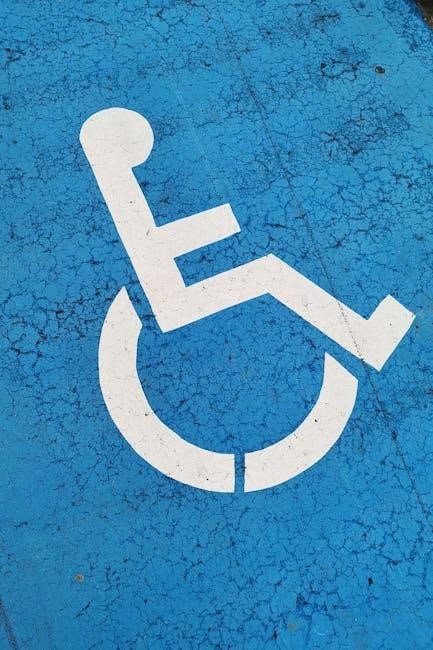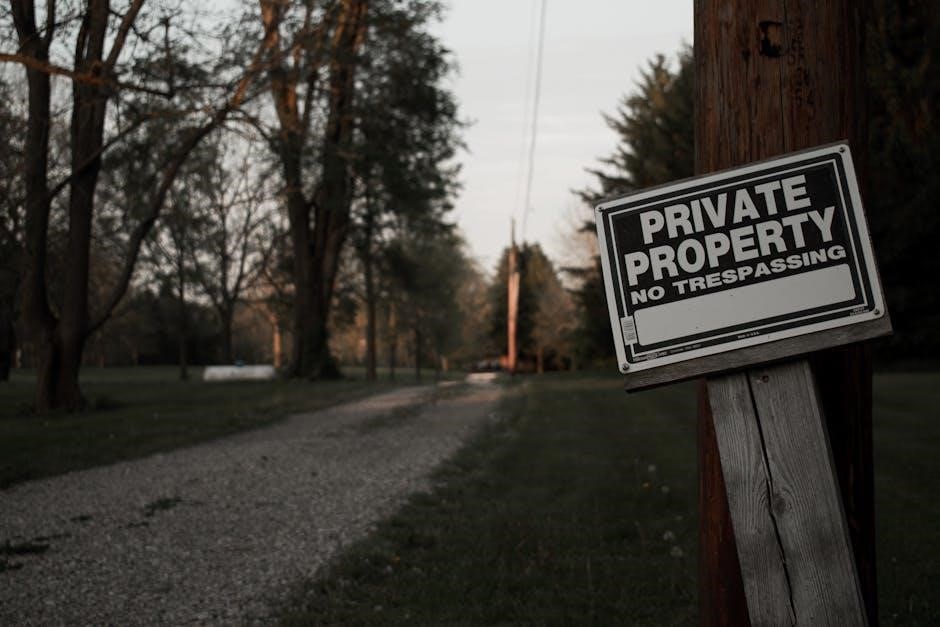
The Ohio Landlord-Tenant Law, primarily governed by the Ohio Revised Code 5321, outlines the rights and responsibilities of landlords and tenants. It provides a framework for rental agreements, security deposits, evictions, and lease obligations, ensuring fair practices for all parties involved in Ohio.
Overview of the Ohio Landlord-Tenant Act of 1974
The Ohio Landlord-Tenant Act of 1974, effective November 4, 1974, establishes the basic rights and responsibilities of landlords and tenants. It applies to most rental agreements, including oral ones, but excludes mobile home parks. The law ensures fair housing practices, outlines eviction procedures, and addresses security deposits, providing a balanced framework for both parties. It remains a cornerstone of Ohio rental law, guiding tenant-landlord interactions statewide.
Importance of Understanding Landlord-Tenant Rights and Responsibilities
Understanding Ohio landlord-tenant laws is crucial for both parties to navigate rental relationships effectively. Tenants gain protection from unfair practices, while landlords ensure compliance, avoiding legal disputes. Clear knowledge of rights and duties fosters mutual respect and accountability, promoting a harmonious living and business environment. This understanding prevents misunderstandings, ensuring both parties fulfill their obligations under the law, maintaining a balanced and fair rental agreement.
Key Rights and Responsibilities of Tenants in Ohio
Tenants in Ohio have rights to fair housing, safe living conditions, and protection from unlawful eviction. They must pay rent, maintain the property, and comply with lease terms.
Tenant Rights Under Ohio Law
Tenants in Ohio are protected under the Ohio Revised Code 5321 and the Ohio Landlord-Tenant Act of 1974. They have the right to fair housing, protection from unlawful eviction, and assurance of habitable living conditions. Tenants are also entitled to written notice for rent increases or lease changes. They cannot be retaliated against for exercising their legal rights, such as requesting repairs or reporting violations. Tenants should seek legal aid for specific disputes or concerns.

Responsibilities of Tenants in Maintaining the Rental Property
Tenants in Ohio are required to maintain the rental property in a reasonable condition. They must comply with all terms of the lease agreement, keep the premises clean, and not cause intentional damage. Tenants are also responsible for promptly notifying the landlord of needed repairs and ensuring their actions do not violate local ordinances or health and safety standards. Failure to fulfill these duties may result in legal consequences or lease termination. Ohio law emphasizes tenant accountability in preserving the property’s condition.
Landlord Rights and Responsibilities in Ohio
Ohio landlords have the right to collect rent, enforce lease terms, and maintain property condition. They must provide habitable premises, comply with housing codes, and handle security deposits properly.
Landlord Rights in Ohio
Ohio landlords have the right to collect rent, enforce lease agreements, and pursue legal action for violations. They can also inspect properties and take legal steps for lease breaches or property damage. Additionally, landlords are entitled to recover attorney fees in certain cases, as outlined by Ohio law. These rights are designed to protect their property and financial interests while maintaining a balanced relationship with tenants.
Duties of Landlords in Ohio
Ohio landlords must maintain habitable living conditions, ensuring compliance with building and housing codes. They are required to provide proper notice for rent increases, lease changes, or termination. Landlords must also handle security deposits according to state law and avoid unlawful eviction practices. Failure to fulfill these duties can result in legal consequences, emphasizing the importance of adhering to Ohio’s landlord-tenant regulations to protect both parties’ interests.

Security Deposits in Ohio
Ohio landlords can collect security deposits to cover unpaid rent and damages. Proper handling is required, and failure to comply may lead to legal consequences.
Maximum Amount and Collection of Security Deposits
Ohio law allows landlords to collect a security deposit, but there is no state-mandated maximum limit. However, landlords must comply with specific rules regarding collection, handling, and storage of deposits. The deposit should be used solely to cover unpaid rent or damages beyond normal wear and tear. Proper documentation and transparency are essential to avoid disputes and legal issues.

Returning Security Deposits and Deductions
Ohio landlords must return security deposits within 30 days of a tenant’s move-out. If deductions are made, an itemized list detailing the costs for damages or unpaid rent must be provided. Tenants are entitled to the remaining balance if no deductions apply. Failure to comply with these requirements can result in legal action, emphasizing the importance of proper documentation and transparency throughout the process.

Consequences of Improper Handling of Security Deposits
Improper handling of security deposits in Ohio can lead to legal consequences for landlords. Tenants may sue for damages, including treble damages in cases of wrongful withholding. Landlords who fail to return deposits or provide proper documentation may face penalties, including court-ordered refunds and attorney fees. Compliance with Ohio’s security deposit laws is crucial to avoid costly disputes and ensure fair treatment for both parties involved.
Eviction Procedures in Ohio
Ohio eviction procedures require landlords to follow specific legal steps, ensuring tenants receive proper notice and court proceedings. The process involves filing an eviction complaint and obtaining a court order, protecting both parties’ rights throughout the eviction process.
Legal Grounds for Eviction
Ohio law permits eviction for non-payment of rent, violation of lease terms, illegal activities on the property, or holding over after the lease expires. Landlords must provide proper notice and follow legal procedures. Tenants may challenge eviction in court if they believe the grounds are unjust or the process is flawed, ensuring protections for both parties under Ohio’s eviction laws.
Proper Notice and Filing Procedures

In Ohio, landlords must provide tenants with written notice before filing for eviction; This includes a 3-day notice for non-payment of rent or a 30-day notice for lease violations. Notices must detail the issue and the tenant’s right to cure it. If unresolved, the landlord files a complaint with the court, serving the tenant properly. Proper documentation and adherence to timelines are crucial to avoid legal delays and ensure compliance with Ohio eviction laws.
Illegal Eviction Practices
Ohio law prohibits landlords from engaging in illegal eviction practices, such as changing locks, removing doors, or shutting off utilities to force a tenant out. These actions violate the tenant’s right to peaceful possession of the property. Landlords must follow legal eviction procedures, including proper notice and court filings. Violations can result in legal consequences, including liability for damages and attorney fees, ensuring tenants are protected from unlawful eviction tactics under Ohio law.
Lease Agreements in Ohio
A lease agreement in Ohio is a binding legal contract between landlords and tenants, governed by the Ohio Landlord-Tenant Act of 1974. It outlines terms, rights, and obligations for both parties, ensuring compliance with state and local laws, including specific requirements in cities like Columbus, Cleveland, and Cincinnati.
Types of Lease Agreements
In Ohio, lease agreements can be fixed-term, month-to-month, or oral. Fixed-term leases have specific start and end dates, while month-to-month agreements renew automatically. Oral leases are enforceable but less common. Both parties are bound by the terms, making written agreements advisable. Lease types must comply with Ohio state law and local ordinances in cities like Columbus, Cleveland, and Cincinnati.
Essential Clauses in a Lease Agreement
A lease agreement in Ohio should include rent payment terms, lease duration, tenant responsibilities, and landlord maintenance obligations. It must also outline security deposit details, notice requirements, and rules for lease termination. Clauses regarding repairs, subletting, and use of the property are also crucial. Ensuring compliance with Ohio state law and local ordinances is essential for both landlords and tenants.

Repair and Maintenance Responsibilities
In Ohio, landlords must maintain habitable premises, addressing essential repairs and ensuring safety. Tenants are responsible for minor repairs, keeping the property clean, and promptly reporting issues.
Landlord’s Duty to Maintain Habitable Premises
Ohio landlords are legally required to maintain rental properties in a habitable condition, ensuring safety and essential systems function properly. This includes addressing structural issues, plumbing, heating, and electrical systems. Tenants can request repairs in writing, and if unresolved, may seek remedies such as rent escrow or legal action. Landlords must act promptly to uphold their legal obligations and prevent unsafe living conditions for tenants.
Tenant’s Responsibilities in Maintaining the Property
Tenants in Ohio are required to maintain the rental property in a clean and safe condition, dispose of waste properly, and comply with housing codes. They must notify the landlord in writing of needed repairs and avoid causing intentional damage. Tenants are also responsible for maintaining plumbing fixtures and ensuring their actions do not disturb others. Failing to meet these obligations can result in legal action or lease termination.
Procedure for Requesting Repairs
Tenants must notify landlords in writing of needed repairs, specifying the issue and requesting timely action. The landlord typically has 30 days to address the problem. If repairs are not made, tenants may seek further legal remedies, such as withholding rent or filing a complaint. Proper documentation is crucial to ensure compliance with Ohio landlord-tenant laws and to protect both parties’ interests effectively.
Notices and Termination of Tenancy
Ohio law requires landlords and tenants to provide proper notice for terminating tenancy, ending leases, or making rent changes, ensuring clarity and fairness in all rental agreements.
Notice Requirements for Rent Increases or Lease Changes
Ohio law mandates that landlords provide tenants with written notice for rent increases or lease modifications. Typically, this notice must be given at least 30 days before the change takes effect. The notice should specify the nature of the change, such as the new rent amount or lease terms. Tenants must receive clear and timely communication to ensure they can review and respond to the proposed adjustments. Proper notice ensures compliance with state regulations. Failure to provide adequate notice may result in legal consequences for landlords, emphasizing the importance of adherence to these requirements. This ensures fair treatment for both parties in rental agreements.
Termination of Tenancy Notice Periods
In Ohio, landlords must provide tenants with written notice to terminate a tenancy. For month-to-month agreements, a 30-day notice is required, while week-to-week tenancies demand a 7-day notice. The notice must specify the termination date and comply with the lease terms. Tenants are expected to vacate the property by the end of the notice period. Proper notice ensures compliance with Ohio landlord-tenant laws and maintains legal protections for both parties involved in the rental agreement.
Early Termination of Lease
In Ohio, both landlords and tenants must adhere to specific legal procedures for early lease termination. Under the Ohio Revised Code, tenants may terminate a lease early only under certain conditions, such as active military duty or landlord breaches of habitability. Landlords must follow proper eviction procedures if seeking early termination. Failure to comply with the Landlord-Tenant Act of 1974 can result in legal consequences for either party, emphasizing the importance of understanding lease terms and state laws.
Attorney Fees and Damages
Ohio landlord-tenant law allows recovery of attorney fees and damages if one party breaches the lease or acts unlawfully. This applies to both tenants and landlords, ensuring legal recourse for violations of rental agreements and property rights, promoting fairness and accountability in rental relationships statewide.
Circumstances Allowing Recovery of Attorney Fees
Under Ohio landlord-tenant law, attorney fees can be recovered in specific situations, such as unlawful eviction, breach of lease terms, or violations of statutory rights. Tenants or landlords who prevail in legal actions related to rental agreements may be entitled to reasonable attorney fees. This provision aims to hold parties accountable for unlawful actions and ensure fairness in resolving disputes, as outlined in the Ohio Revised Code.
Recovering Damages for Breach of Lease
In Ohio, landlords or tenants can seek damages for a breach of lease, including unpaid rent, property damage, or early termination. The non-breaching party must provide written notice and allow a reasonable time for correction. If unresolved, they can pursue legal action to recover costs. Courts may award damages and attorney fees if the breach is proven, ensuring compliance with the terms of the rental agreement under Ohio law.

Local Ordinances and Additional Requirements
Ohio landlords must comply with both state and local laws, including specific ordinances in cities like Columbus, Cleveland, and Cincinnati, ensuring adherence to all regulatory requirements.
Columbus, Cleveland, and Cincinnati Specific Laws
In Ohio, cities like Columbus, Cleveland, and Cincinnati have additional ordinances beyond state law. Columbus requires landlords to inform tenants of payment options, while Cleveland enforces specific lease terms. Cincinnati has unique rules for security deposits and eviction processes. These local laws ensure compliance with both state and municipal regulations, providing further protections for tenants and clarifying obligations for landlords in these major cities.
Compliance with State and Local Regulations
In Ohio, landlords must adhere to both state laws and local ordinances. This includes following the Ohio Landlord-Tenant Act and specific city regulations, such as those in Columbus, Cleveland, and Cincinnati. Proper compliance ensures legal rental operations, protecting both landlords and tenants. Failure to comply can result in legal consequences, emphasizing the importance of understanding and abiding by all applicable laws and regulations in each jurisdiction.